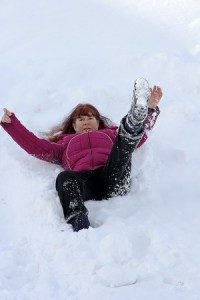
Let’s say you are in the parking lot of a grocery store after a big snowstorm. The parking lot has yet to be cleared of the snow and ice. You had no trouble parking your car, yet as soon as you take a few steps toward the store, the icy surface causes you to slip, fall, and break your hip. Obviously the store is at fault, right?
The obvious part in this scenario is that the weather had played a major part in your accident. Because the store had failed to clear the snow and ice from its parking lot, it can be held liable for your slip and fall case. As we mentioned in our recent premises liability blog series, the store has an obligation to keeping the area safe for its customers and that means removing slip and fall hazards before an accident can occur.
But let’s change the scenario a little. Let’s say you’re visiting a neighbor to make sure they are ok after such a nasty day. As you walk up your neighbor’s driveway, you slip on a patch of ice and fall. So you can sue your neighbor, right?
In this scenario, no. If you slip and fall on the property of a single family residence, then you are unable to sue the owner. The private residence owner generally has no duty to either remove or warn about the risk associated with snow and ice. Not only that, but the owner is generally not held liable for any injuries caused by weather. However, the property is an apartment complex or multifamily dwelling, then the same rules apply to the property owners as it does to commercial properties.
As you can see, slip and fall accidents can be extremely complex and you need to have an experienced personal injury lawyer by your side to help you with your claim. Contact the Law Offices of Anthony Carbone now for a free consultation.